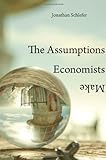下記の本を出版したJonathan SchleferをEconomixブログがインタビューし、それをMostly Economicsが引用している。

The Assumptions Economists Make
- 作者: Jonathan Schlefer
- 出版社/メーカー: Belknap Press
- 発売日: 2012/03/20
- メディア: ハードカバー
- 購入: 1人 クリック: 23回
- この商品を含むブログを見る
Q. To what extent do you see a “march of progress” in the efforts of successive generations of economists to build useful models of the real economy?
A.There is a kind of progress in economics. Critics point out flaws in models; supporters revise the models to respond; and the models do become sharper. For example, John Maynard Keynes’s “General Theory” was a brilliant book, but his model was somewhat muddy, if you even grant that he had a model per se. If his model had been clearer, there wouldn’t have arisen so many disputing schools of “Keynesians” (with various prefixes and suffixes to distinguish themselves). But whichever side you’re on in these disputes, the models favored by different sides have become sharper and the bases of disputes clearer.
Q. You are particularly critical of neo-classical economics, which has its roots in the late 19th century. As you note, that was a period of great optimism that the world was an orderly place and that scientific inquiry would shortly discover those rules. In economics, this expectation culminated in the “discovery” that markets move naturally toward stable equilibriums. Scientists long ago concluded that natural systems actually tend toward entropy. Why has faith in an orderly universe endured so much longer among economists?
A. I think economists’ faith in an orderly universe is Platonist: There is an absolute orderly world, they hope, if only we could logically uncover it. These market imperfections surrounding us are mere deviations from the harmony of market equilibrium. Platonism is appealing. We would like certainty. But the Platonic ideal is either inaccessible — an almost religious faith that you cannot apply to practical policy — or it’s corrupt if you try to apply it. Thomas Sargent [an economist at New York University, and Nobel Prize laureate] wrote a fascinating essay called “Evolution and Intelligent Design.” Sargent means the term intelligent design to capture some hope for a perfect order, which he finds in tension with disorderly evolution.
The Platonic vision can persist in economics because economic models are mathematical (in that sense Platonic), and you can never decisively prove them wrong. You can say President Obama’s stimulus worked because the economy would have done worse without it. Or you can say it failed because the economy would have done better without it. But you can’t decisively prove how the economy would have behaved without the stimulus. There are rational ways of weighing these disputes, but they rarely persuade people to change their minds. Physics models can be tested in experiments, which can be replicated anytime, anywhere, but economic models cannot. So you can maintain Platonic visions.
(拙訳)
- インタビュアー
- 経済学者が世代から世代に亘って有用な現実世界のモデルを構築しようとした試みにおいて、どの程度「進歩の行進」*1が見られますか?
- Schlefer
- 経済学は一応進歩しています。批判者はモデルの欠点を指摘し、支持者はそれに対応してモデルを修正するため、モデルは良くなります。例えば、ジョン・メイナード・ケインズの「一般理論」は素晴らしい本でしたが、彼のモデルは、仮にそういうものがあったとしても、曖昧なものでした。もし彼のモデルがもっと明確だったら、(様々な接頭辞や接尾辞を付けてお互いに差別化を図っている)論争的な「ケインジアン」学派があれほど多く出現することは無かったでしょう。しかし、論争のどの側に立つにしろ、論敵が拠り所とするモデルは改善し、論争の基盤もより明確になります。
- インタビュアー
- あなたはとりわけ、誕生を19世紀後半に遡る古典派経済学に批判的です。あなたが指摘したように、それは大いなる楽観主義の時代で、世界は秩序ある場所であり、科学的探究はまもなくその法則を解き明かすと思われていました。経済学におけるそうした期待は、市場が安定した均衡に自然に向かうという「発見」で頂点に達しました。科学者たちはかなり前に、自然な系は実際にはエントロピー増大の方向に向かうと結論付けました。経済学者の間で秩序ある世界への信仰が、依然としてこれほど長く残っているのはなぜでしょうか?
- Schlefer
- 経済学者の秩序ある世界への信仰は、プラトン主義だと思います。絶対的な秩序ある世界があり、我々が論理的に明らかにすることを待っている、と彼らは期待しているのです。我々が目にする市場の不完全性は、調和の取れた市場均衡からの逸脱に過ぎない、というわけです。プラトン主義は魅力的です。我々は確実性を好むからです。しかし、プラトン的な理想は、到達不可能――実際的な政策に応用不可能な、ほとんど宗教的な信仰――であるか、応用しようとすると壊れてしまうか、のいずれかです。トーマス・サージェント[ニューヨーク大学のノーベル賞受賞経済学者]は、「進化と知的設計」という素晴らしいエッセイを書きました。サージェントがそこで述べたのは、知的設計という言葉は完全な秩序への希望を体現しているのではないか、ということでした。そうした完全な秩序への希望は、無秩序な進化とは緊張関係にあると彼は見ています。
プラトン主義的な見方が経済学で存続できるのは、経済学モデルが数学的(その意味でプラトン的)で、間違いを決定的な形で証明することが決してできないからです。オバマ大統領の刺激策は機能した、なぜならばそれなしでは経済は悪化していたからだ、と言うことができます。その一方で、その政策は失敗した、なぜならばそれがなければ経済は改善していたからだ、と言うこともできます。しかし、刺激策なしで経済がどうなっていたかを決定的に証明することはできません。こうした議論を比較衡量する合理的な方法は存在しますが、それによって人々を説得し、考えを変えさせるということはまず起きません。物理学モデルは、いつでもどこでも再現可能な実験で検証できますが、経済学モデルではそれはできないのです。そのためプラトン主義的な見方を維持することが可能になります。